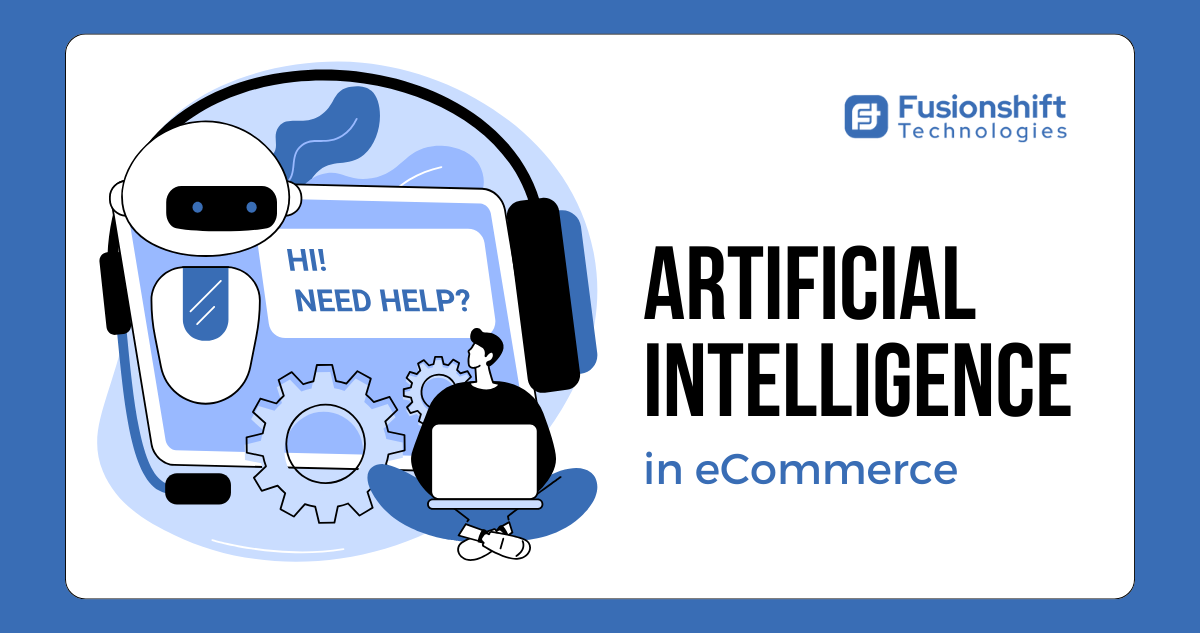AI in eCommerce
In the digital age, eCommerce has become integral to our lives, shaping how we shop and interact with brands. With the advancement of technology, particularly Artificial Intelligence (AI), the online shopping landscape is undergoing a profound transformation. From personalized recommendations to better customer service, AI is revolutionizing how businesses operate and customers’ online shopping experience. In this blog, we at FusionShift Technologies will delve into the importance of AI in eCommerce and explore its potential to redefine the future of online shopping.
Personalized Shopping Experience
One of AI’s most important contributions to eCommerce is its ability to deliver personalized shopping experiences. Artificial intelligence algorithms analyze large amounts of data, including previous purchases, browsing history, demographic information, and social media activity, to understand individual preferences and behaviors. Using this information, eCommerce platforms can tailor product recommendations, discounts, and promotions to match each customer’s unique interests. By offering relevant suggestions and personalized content, AI improves customer engagement and builds brand loyalty.
Predictive Analytics for Inventory Management
AI-based predictive analytics is transforming inventory management in eCommerce. AI algorithms can accurately forecast product demand by analyzing historical sales data, market trends, and external factors such as weather patterns or social events. This allows companies to optimize inventory levels, minimize stock outs, and reduce excess inventory. AI-powered inventory management improves operational efficiency and customer satisfaction by ensuring the right products are available at the right time.
Visual Search and Image Recognition
AI-powered visual search technology is changing the way customers discover products online. Instead of relying solely on text-based searches, users can now upload images or screenshots to find visually similar products on eCommerce platforms. AI algorithms analyze visual attributes of images, such as color, shape, and texture, to identify relevant products from extensive catalogs. This not only simplifies the process of finding customers but also opens up new opportunities for eCommerce companies to display their products visually appealingly.
Virtual Assistants and Chatbots
AI-powered virtual assistants and chatbots are reshaping customer service in eCommerce. These intelligent systems can handle various customer inquiries, from product recommendations and order tracking to problem resolution and returns processing. Virtual assistants provide fast and accurate responses by leveraging natural language processing (NLP) and machine learning algorithms, improving the overall shopping experience. Additionally, they can operate 24/7, ensuring round-the-clock support for customers in different time zones.
Fraud Detection and Prevention
AI algorithms are crucial in detecting and preventing fraudulent activities in eCommerce. By analyzing patterns and anomalies in transaction data, AI-based fraud detection systems can identify suspicious behavior in real-time, such as unusual purchasing patterns or fraudulent payment methods. Advanced machine learning techniques allow these systems to adapt and evolve, staying ahead of sophisticated fraudsters. By protecting against fraud, AI instills customer trust, thereby encouraging more online transactions.
As AI evolves, its impact on eCommerce will only strengthen. From personalized shopping experiences to streamlined operations, AI is reshaping every aspect of the online shopping process. By harnessing the power of AI-driven technologies, eCommerce businesses can gain a competitive advantage in today’s digital marketplace. As we look to the future, AI promises even more innovation and disruption, paving the way for a new era of online shopping that is smarter, more intuitive, and more personalized than ever.








